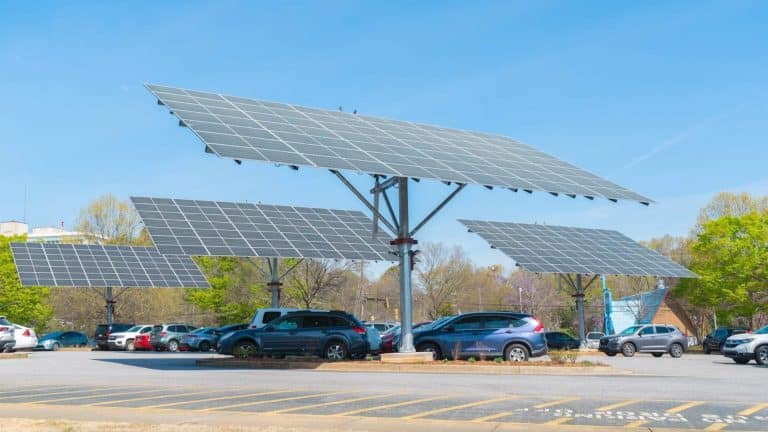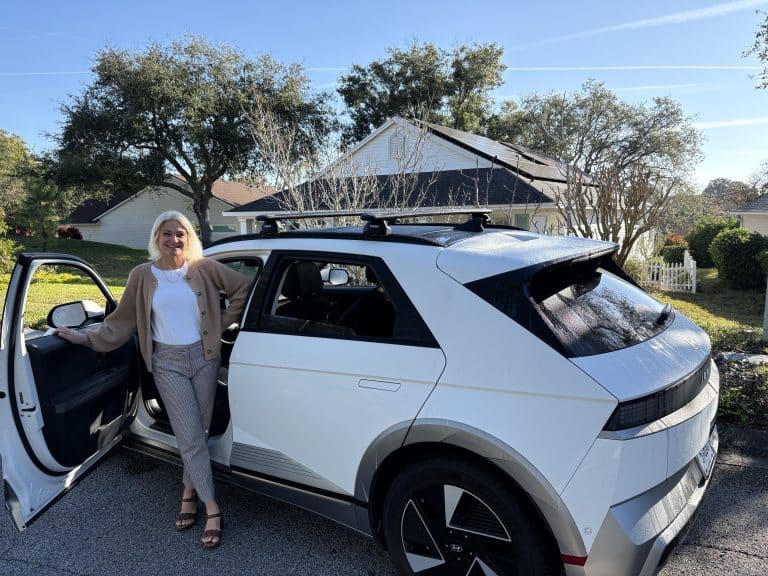Charlotte, NC — Today, the Southern Alliance for Clean Energy (SACE) announced the launch of a new electric vehicle (EV) carsharing program in Charlotte, North Carolina, in partnership with Centralina Regional Council and the City of Charlotte.
The program is part of a nationwide Affordable Mobility Platform (AMP) funded by the U.S. Department of Energy and managed by Forth Mobility. The purpose of AMP is to increase access to electric transportation by making low-cost EVs available to underserved communities. Out of the 10 participating cities in the U.S., Charlotte is the only one in the Southeast.
The EV carsharing program will launch in July of 2023, with 10 shared EVs that will be made available to residents and staff in five affordable housing developments across the city. Though final confirmations are pending, the five developments that have committed represent 538 housing units, and eligible residents with valid driver’s licenses will have the opportunity to first test drive the vehicles through ride-and-drive events, allowing them to become more familiar with the technology. For future trips, residents will be able to reserve the vehicles online and rent them at a small hourly or daily fee. The program is funded for two years and designed with the intention to continue as a self-funded model in the years to come.
“With Governor Cooper’s administration’s focus on the rapid and equitable shift to electric transportation, this innovative project will serve as a model for wider-scale EV sharing in underserved communities across the state,” Stan Cross, Electric Transportation Policy Director at the Southern Alliance for Clean Energy (SACE), said.“The Southern Alliance for Clean Energy has been advocating for centering equity in state electric transportation policies, plans, and programs, and we are excited to roll up our sleeves with our partners and help get it done.”
Additionally, the program will address a critical issue of a lack of charging options for residents of multi-unit housing, which has been considered a key barrier to mass EV adoption. AMP will install two EV chargers at each housing location. Each charger will come equipped with two ports. One port will power the shared electric vehicle, and the other will be used for charging vehicles from the surrounding communities.
“AMP presents a novel model that addresses several intersectional issues faced by many middle to lower-income residents,” Patrick King, Electric Transportation Equity Manager at SACE, said. “The program provides a means of transportation that reduces emissions and at a low cost that’s a fraction of traditional vehicle ownership. The benefits of which improve the air quality, not just for members of the housing developments but for all communities.”
Drivers who use a carsharing system can access a car when needed without having to pay the costs of maintenance, repairs, and insurance associated with traditional ownership. These costs can be extremely burdensome, especially for lower-income residents for whom transportation costs can consume a significant portion of their household spending.
“Because transportation makes up 40% of Charlotte’s total greenhouse gas emissions, decarbonizing this sector through electrification is a critical strategy for a low carbon future,” said Sarah Hazel, Chief Sustainability and Resiliency Officer at the City of Charlotte. “We are thrilled to partner on an impactful initiative that centers residents of affordable housing in our electrification journey as we work towards a healthy, equitable, sustainable Charlotte.”
Electric car sharing is efficient and benefits the environment and public health. EVs are oil-free, produce no smog, and produce 85% fewer carbon emissions than traditional cars. The benefits can be magnified when the vehicles are powered by electricity produced from renewable energy sources like solar and wind.
By placing 80 EVs in 10 cities across the US, this project will bring low-cost electric vehicles to underserved communities and demonstrate a scalable model that increases access to clean transportation.
“Our region is at the crossroads of equity and unprecedented levels of funding for transportation electrification; therefore, this project is extremely timely and will further define the role local governments can play in the deployment of electric vehicles for everyone,” Jason Wager, Assistant Director at Centralina Regional Council and Director, Centralina Clean Fuels Coalition, a US DOE Clean Cities affiliate, said.“The Centralina Clean Fuels Coalition, housed at the Centralina Regional Council, is poised to build on its previous EV project learnings to the benefit of our region and beyond.”
About the Southern Alliance for Clean Energy
Since 1985, the Southern Alliance for Clean Energy has worked to promote responsible and equitable energy choices to ensure clean, safe, and healthy communities throughout the Southeast. Learn more at www.cleanenergy.org.
About Centralina Regional Council
Centralina Regional Council is an innovative regional planning agency located in Charlotte, NC with a membership that includes 60+ local governments throughout the Greater Charlotte Region. Centralina works with individual communities and leads major projects that transcend local and regional boundaries to expand opportunity and improve quality of life. Learn more at centralina.org.
About the City of Charlotte
The City of Charlotte provides services to more than 870,000 residents. The city’s priorities are workforce and business development; transportation, planning and the environment; safe communities; and great neighborhoods. Charlotte is No. 6 on US News & World Report’s 150 Best Places to Live in the US in 2020-21. For the latest news and updates about city government, visit the citywide newsroom at charlottenc.gov/newsroom, and follow @CLTgov on Facebook, Twitter, and Instagram.
About FORTH
Forth is a non-profit organization dedicated to the equitable advancement of clean transportation. Forth builds program and policy models that significantly expand equitable access to electric transportation in the U.S. and beyond. Learn more at forthmobility.org


